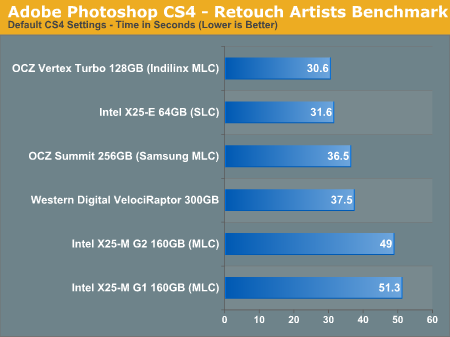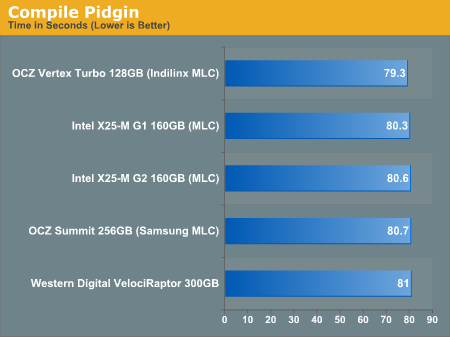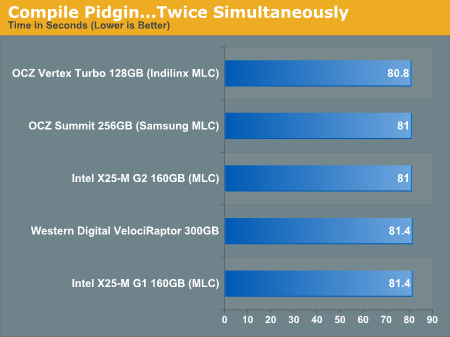The SSD Relapse: Understanding and Choosing the Best SSD
by Anand Lal Shimpi on August 30, 2009 12:00 AM EST- Posted in
- Storage
Individual Application Performance
PCMark Vantage does a great job of summarizing system performance, but I thought I'd pick a couple of applications to showcase real world strengths/weaknesses of these drives.
The first test is our Photoshop CS4 benchmark by the Retouch Artists. I made one small change to the way this test is run however. Normally I set the number of history states in Photoshop to 1, this significantly reduces the impact of the HDD/SSD on the test and makes it a better measure of CPU/memory speed. Since this is an SSD article, I've left the setting at its default value of 20. The numbers are now a lot lower and the performance a lot more disk bound.

I didn't run all of the drives through this test, just one from each major controller. The results speak for themselves. The Indilinx drives are actually the fastest MLC drives here. Even the Samsung is faster than the Intel drives in this test. Why? Sequential write speed. Even the VelociRaptor has a higher sequential write speed than the X25-M. So while sequential write speed isn't the most important metric to look at when evaluating an SSD, there are real world situations where it does matter.
Intel's performance here is just embarassing. Sequential write speed is something Intel needs to take more seriously in the future. Throw in any amount of random read/write operations alongside your Photoshop usage and the Intel drives would redeem themselves, but this is a very realistic snapshot of their achilles' heel.
Many of you have been asking for compiler benchmarks so I did just that. I grabbed the latest source for Pidgin (a popular IM application) and followed the developer's instructions on building it in Windows:

Nada. I thought perhaps it wasn't stressful enough so I tried building two instances in parallel:

And...nothing. It seems that building Pidgin is more CPU than IO bound, or at least its IO access isn't random enough to really benefit from an SSD. I'll keep experimenting with other compiler tests but this one appears to be a bust for SSD/HDD performance testing.










295 Comments
View All Comments
valnar - Wednesday, September 2, 2009 - link
Anyone?antinah - Tuesday, September 1, 2009 - link
For another great article on the SSD technology.I'm considering an Intel G2 for my brand new macbook pro, and if I understand what I've read correctly, performance should not degrade too much although OSX doesn't support trim yet.
I also doubt Apple will wait too long before they release an update with trim support for osx.
I just recently switched to mac after a lifetime with pc/windows. Anything i shoud be aware of when I install the SSD in a mac compared to pc running windows? (other than voiding the warranty and such). I'm thinking precations regarding swap usage or such.
Best regards from norway
Stein
medi01 - Tuesday, September 1, 2009 - link
So I absolutelly need to pay 15 times as much per gigabyte as normal HDDs, so that when I start Photoshop, Firefox and WoW, straight after windows boots, it loads whopping 24 seconds faster?That's what one calls "absolutelly need" indeed and you also chose amazingly common combination of apps.
Anand Lal Shimpi - Tuesday, September 1, 2009 - link
You can look back at the other two major SSD pieces (X25-M Review and The SSD Anthology) for other examples of application launch performance improvements. The point is that all applications launch as fast as possible, regardless of the state of your machine. Whether you're just firing it up from start (which is a valid use scenario as many users do shut off their PCs entirely) or launching an application after your PC has been on for a while, the apps take the same amount of time to start. The same can't be said for a conventional hard drive.Take care,
Anand
Seramics - Tuesday, September 1, 2009 - link
its not abt the 24seconds but rather the wholly different experience of near instantaneous u get wit ssd tht cannot be replicated by hddsmedi01 - Tuesday, September 1, 2009 - link
Nobody starts mentioned apps together directly after boot.I've played WoW for a couple of years, and never had to wait dozen of seconds for it to start.
Most well written applications start almost instantly.
And the whole "after fresh boot" is not quite a valid option neither, I don't recall when I last switched off my pc, "hibernate" works just fine.
The "you get completely different experience" MIGHT be a valid point, but it was destroyed by ridiculous choice of apps to start. And I suspect that it is because NOT starting stuff all together and right after boot, didn't show gap as big.
kunedog - Tuesday, September 1, 2009 - link
Anand, I think your article titled "Intel Forces OCZ's Hand: Indilinx Drives To Drop in Price" (http://www.anandtech.com/storage/showdoc.aspx?i=36...">http://www.anandtech.com/storage/showdoc.aspx?i=36... could also use a follow-up, primarily to explain why the opposite has happened (especially with the Intel drives). Is this *all* attributable to Intel's disaster of a product launch? Maybe not, but in any case it deserves more attention than a brief mention at the end of this article.zero2espect - Tuesday, September 1, 2009 - link
great work again. it's for this reason that i've been coming here for ages. great analysis, great writing and an understanding about what we're all looking for.one thing that you may have overlooked is the difference in user experience due to the lack of hdd "buzz". fortunate enough to find myself in posession of a couple of g2160gb jobbies, one is in my gaming rig and the other in the work notebook. using the notebook the single biggest difference is speed (it makes a 18mo old notebook seems like it performs as fast as a current generation desktop) but the next biggest and very noticible difference is the lack of "hum", "buz", "thrash" and "vibrate" as the drive goes about it's business.
thanks anadtech and thanks intel ;-P
Mr Perfect - Tuesday, September 1, 2009 - link
Anand,Would you happen to know if there are different revisions of the G2 drives out? Newegg is listing a 80GB Intel drive with model #SSDSA2MH080G2C1 for $499, and another 80GB Intel with model #SSDSA2MH080G2R5 for $599. They are both marked as 2.5" MLC Retail drives, and as far as I can tell they're both G2. What has a R5 got that a C1 doesn't? The updated firmware maybe?
Thanks!
PS, dear Newegg, WTF? 100% plus price premiums? I'm thinking I'll just wait until stock returns and buy from another site just to spite you now....
gfody - Tuesday, September 1, 2009 - link
It looks like the R5 is just a different retail package - shiny box, nuts and a bracket instead of just the brown box.Why Newegg is charging an extra $100 for it.. just look at what they're doing with the other prices. I am losing so much respect for Newegg right now. disgusting!